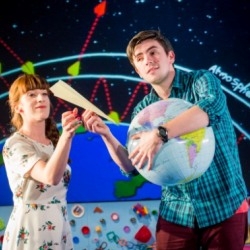Catherine Love: Playing the future

© Robert Workman
This weekend, I visited the future. Well, not quite. On Saturday afternoon, I dropped into FutureFest, a two-day event organised by Nesta to look ahead at things to come – from future trends in food to how we might shape the economy and tackle climate change. The festival at Shoreditch Town Hall brought together scientists, economists, businesspeople and various different thinkers, alongside a number of performances.
I was there mainly to see FuturePlay, an interactive and immersive new piece of game theatre from self-described “playmakers” Coney. The company’s work has always positioned audiences as vital players in their shows, asking them to make choices that shape their theatrical experience, but FuturePlay is a little different. As the project depends so much on mystery and surprise, it would be mean-spirited of me to reveal too much about it; suffice to say, the experience extends beyond the immediate playing space and into the world outside.
While it’s almost impossible to discuss FuturePlay without dropping any spoilers, the show did make me think about the role theatre might play in helping us to imagine the future. It’s not difficult to make a list of theatrical treatments of the years to come – most of them cautionary dystopias – but what about how theatre might help to shape the future as well as simply predict it?
As the latest report from the IPCC has just reminded us, one of the greatest threats on the horizon is climate change. It’s a topic that theatre is no stranger to, but most shows to date have taken a pretty bleak view, none more so than the unremittingly pessimistic Ten Billion. Perhaps, as Ten Billion suggests, change is beyond our powers, but if we do still have the ability to curb global catastrophe then it is a positive approach that is likely to make the difference. As the title of the Tyndall Centre’s 2009 report ‘Fear Won’t Do It’ suggests, scare tactics don’t work; we need to believe instead that we can change things for the better.
So I was intrigued to hear about The Planet and Stuff at the Polka Theatre, a new interactive lecture for kids that has been devised by theatre-makers Simon Daw, Joel Horwood and Lucy Kerbel. Inspired by the format of TED talks, the piece aims to demystify climate change for younger (and older) audiences, while equipping them with the tools to do something about it. Like FuturePlay, it also offers a level of involvement within the show, with the hope that action in the theatre might translate into action in the world.
It is never quite that simple, and to imagine that interactive theatre can automatically create more active citizens would be naively idealistic, but it is not so far-fetched to see the theatre as an arena where we might come together to contemplate the horizon. Theatre is often acknowledged as a space of collective imagination, a place where people gather to share thoughts, fantasies, hopes and fears. Where better to imagine a collective future?










